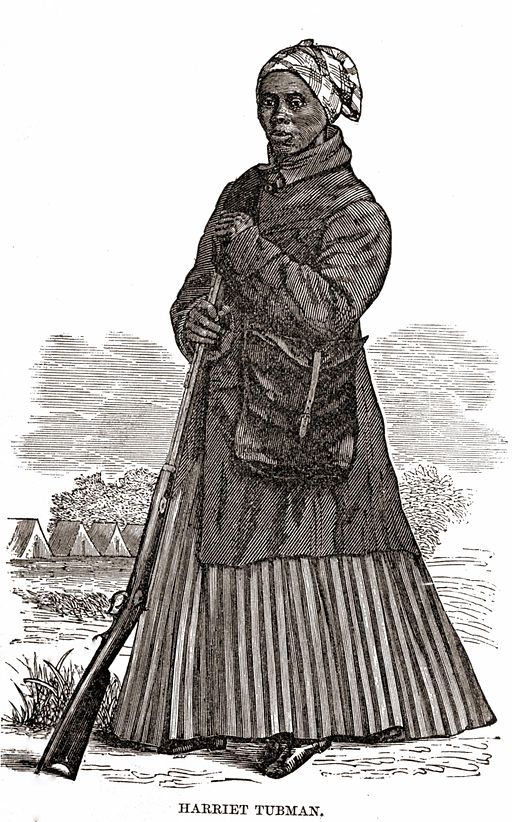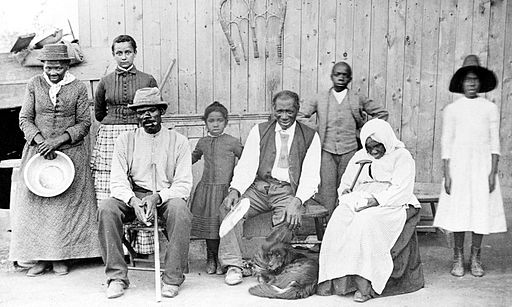She was given the name Araminta “Minty” Ross when she was born around 1821 in the county of Dorchester in Maryland, but later adopted the name Harriet (from her mother) and Tubman (from her first marriage). She was among the ten children of a slave couple, Benjamin Ross and Harriet Greene.
Harriet Tubman was the greatest among all heroines who fought against slavery. She freed herself from slavery and later helped three hundred more slaves to liberty. Like all heroes and heroines, Harriet also possessed exceptional qualities that made her perform courageous acts.
Valiant
At 12 years old, she worked as a field hand. In the field while they were working, one slave ran away. She helped him escape by placing herself in the doorway to stop the overseer from catching him. The overseer picked up a load weighing two pounds in an attempt to stop the escaping fugitive. Harriet was hit, instead of him. It broke her skull that lead to her lifelong episodes of somnolence. Even as she was chatting with someone or performing a task, she would fall asleep and wake up some time later.
Hardworking
After her wound healed and she recovered from the accident, Harriet served in John Stewart’s home for five to six years. In the beginning, she was a house maid, but later on performed other strenuous tasks just to earn $50 to $60 that was ordinarily obtained by a woman of her stature during that time. She plowed the field, drove oxen, chopped wood and a lot more. Later in life, she recalled these hard labors as blessings because they gave her a firm foundation for the trials she faced afterward.

Resourceful
In 1844, Harriet married a freeman, John Tubman. She wanted to travel north where she can be free so her marriage will not be split apart. However, her husband did not support her dream and even threatened her that he would tell her masters if she ran away.
In 1849, her master died and she learnt that she and her two other brothers will be sold to other masters in the far South. The siblings then decided to run away on that night. She, however, cannot run away without first telling her friends of their plan to escape. Since slaves were not allowed to talk with each other publicly, she simply walked among her fellow slaves while singing:
When dat ar ol’ chariot comes
I’m gwine to leabe you;
I’m boun’ for de Promised Land;
Frien’s, I’m gwine to leabe you.I’m sorry, frien’s, to leabe you;
Farewell! oh, farewell!
But I’ll meet you in de mornin’;
Farewell! oh, farewell!I’ll meet you in de mornin’
When you reach de Promised Land;
On de oder side of Jordan,
For I’m boun’ for de Promised Land.
Unwavering
She and her two brothers started with their escape towards the North. They trod on paths they were not certain of. Eventually, her siblings became overwhelmed with fear of being recaptured so they turned back. Yet, Harriet remained fixed on watching the North Star as her guide as she attempted to seek freedom from slavery. Without friends or money, she bravely walked through regions unknown to her. At daytime, she was consciously hiding and only resumed her traveling when it became dark again.
She did not know whom to trust or if her pursuers are already near so she was very cautious and cunning in approaching people from whom to ask for food and shelter. One day she hitched a ride from a couple she saw passing by. Fortunately, the husband and wife were abolitionists who helped take her to Philadelphia. While in Pennsylvania, she found employment from which she saved some money to help free other slaves.
Served Others Without Rewards
After Harriet Tubman escaped from slavery, she returned to slave-holding states many times to help other slaves escape. She led them safely to the northern free states and to Canada. It was very dangerous to be a runaway slave. There were rewards for their capture…. Whenever Tubman led a group of slaves to freedom, she placed herself in great danger. There was a bounty offered for her capture because she was a fugitive slave herself, and she was breaking the law in slave states by helping other slaves escape.
In 1850, she became an official conductor of the Underground Railroad. She knew all routes toward the free territory and was also silent about the Underground Railroad. December of that year, she saved a sister and her children. About a year after that, she made yet another trip to save eleven more slaves, with her brother included. At that time, a Fugitive Slave Law was passed, whereby stipulating that it is unlawful for any citizen to aid escaping slaves. Codes were created by the Underground Railroad to be more secretive. Also, instead of delivering slaves to the Northern part of the US, they were brought to Canada. Despite the dangers, Harriet remained brave and firm. She tried all her best to serve others without getting anything back in return.
As she conducted the escaping slaves to their freedom, things certainly were not easy especially during winter season. The poor fugitive slaves were not used to Canada’s climate and merely chopping wood in the snow was almost too much to bear. Often, they were hungry and frostbitten as they were poorly clothed. She prayed for them and somehow all of them got through the winter. Spring came and she went back to the US to work as a cook for families and hotels. Then, in 1852, she once again went to Maryland to help free nine other slaves. 1857 was the year when she freed her aged parents from slavery after a very venturesome journey.

Key Locations In The Life Of Harriet Tubman
Remained Strong In The Midst Of A Pain
In 1851, two years after her successful escape, she was back at Maryland only to find out that her husband had taken another wife instead. This caused her intense pain, but she was not one to despair. Instead, she focused her attention to fulfilling what she has come to believe is her purpose in life.
Motivated Others
The journey to freedom was never easy as dangers were always nearby in addition to the rough road that the fugitives had to travel on. Harriet motivated her fellow fugitive slaves in her own unique way. She always carried a pistol that she would point to those whose resolve in escaping started to wane. She tells them that they either go on their journey or die right there and then. Although this is obviously a threat, it was an effective way of pushing her people towards freedom.

By woodcut artist not listed; W.J. Moses, printer; stereotyped by Dennis Bro’s & Co. [Public domain], via Wikimedia Commons
Firmly Believed In God
One exemplary character of Harriet was her trust in God. In virtually everything she did, her faith was unwavering. For her, her prayers for help were always answered. One time, when the house of a Negro that served as a regular station for the Underground Railroad was unavailable, she sent a prayer to God for help. After waiting faithfully, deliverance was granted to them.
Unselfish And Generous
Over time, the story of her heroic deeds reached the knowledge of other great abolitionists and men who took part in liberating Negro slaves. These were men like Thomas Garrett, Wendell Philips, and Gerrit Smith. She was given money from time to time but did not spend it on any personal things. In fact, the meager salary she earned, she even used for working to free other fellow slaves.

Harriet Tubman (c. 1820 – March 10, 1913), far left, with slaves she helped rescue, during the American Civil War. Left to right: Harriet Tubman; Gertie Davis {Watson} (adopted daughter of Tubman} behind Tubman; Nelson Davis (husband and 8th USCT veteran); Lee Cheney (great-great-niece); “Pop” {John} Alexander; Walter Green; Blind “Aunty” Sarah Parker; Dora Stewart (great-niece and granddaughter of Tubman’s brother Robert Ross aka John Stewart).
Committed To Serving Others
During the Civil War, Tubman worked for the Union army as a nurse, a cook, and a spy. Her experience leading slaves along the Underground Railroad was especially helpful because she knew the land well.
With a commitment to service, Harriet joined the great men in their fight During Civil War. On a gunboat raid in 1863, she was with Col. James Montgomery and a group of 150 soldiers. They were able to surprise the rebels of the Confederate with the help of the information she gathered from her scouts. Still, during the war, Harriet performed the duties of a nurse and tried to heal the sick and the injured with the use of herbs and medicinal roots.
When the war ended, she made a home in Auburn and built a refuge for the elder Negroes. She also married for the second time and was thus also known by the name Harriet Tubman Davis. On March 10, 1913, her adventure-filled and fruitful life ended. In the auditorium in Albany, a tablet was unveiled on June 12, 1914, to honor this great woman.


